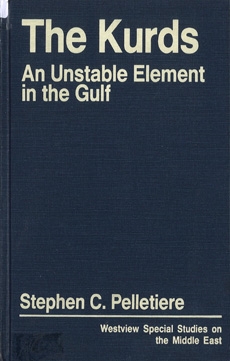|
WESTVIEW SPECIAL STUDIES ON
THE MIDDLE EAST
The Kurds: An Unstable Element in the Gulf
Stephen C. Pelletiere
A major—and often unpredictable—force in the Middle East for centuries, fragmented by the boundaries of Iraq, Iran, Turkey, Syria, and Russia, the Kurds remain a nation that steadfastly resists assimilation (and elimination) and that frequently engages in violent revolts. In this book, Dr. Pelletiere analyzes the factors contributing to the remarkable survival of Kurdish nationalism and places the Kurds in the context of modem Middle East history. First establishing the Kurdish identity and contrasting it with that of surrounding ethnic groups, he goes on to trace Kurdish history and to examine the configuration of the Kurdish national movement during the world wars and the period immediately following the wars, when the Kurds were temporarily supported by the Soviet Union. He also examines the Kurds’ struggles against successive Middle Eastern powers and looks at the national autonomy that was forfeited because of clashes between modern and feudal forces within the Kurdish movement. The book closes with a discussion of possible future developments for the Kurds and the advantages and drawbacks of various sorts of U.S. involvement. Dr. Pelletiere destroys many myths about the Kurds and treats them not as a cultural artifact but as an important factor in the power equation of the Middle East.
Dr. Stephen Pelletiere is assistant professor of politics at Union College. He was formerly a journalist and lived with Mulla Mustafa Barzani when the legendary Kurdish leader was fighting his war against Iraq. Dr. Pelletiere has known most of the Kurdish leaders in the United States, Europe, and the Middle East and has interviewed members of the Politburo of the Kurdish Democratic party in exile in Iran.
Preface
This book examines the political significance of a Middle Eastern people, the Kurds, and it suggests that they have a great potential for making trouble. Indeed, that potential probably is greater today than at any previous time in the Kurds’ long history. A number of factors contribute to this trouble-making ability. First, the Kurdish society basically is anarchic, and the Kurds have a long tradition of serving as mercenaries in the armies of Europe and the Middle East— which is to say that the Kurds are a fighting people. Second, the Kurds’ traditional homeland, Kurdistan, is crucially located where the superpowers confront each other in the Gulf region. Finally, Kurdistan is an inhospitable land that is hard to penetrate, particularly with modern, mechanized armies.
Taken in combination what do these three factors tell us? The Kurds are a fighting people who would be difficult to rout, even though they are continually disrupting the peace in an area that is adjacent to the Gulf where the superpowers want to maintain stability.
Today, there is a particularly troublesome war—for the superpowers—in the Gulf. Since the summer of 1983, the principal combatants, Iran and Iraq, have been fighting each other, to a large extent through Kurdish proxies. Iran’s overall war plan is to carry the fighting into Iraqi Kurdistan in the hope that the Kurds there will revolt against Baghdad. Conversely, Baghdad is subsidizing a revolt of Iranian Kurds against Tehran. This is not the first time the Kurds have become involved in a conflict that threatened to involve the world’s superpowers. In fact, they have done so on three separate occasions since the end of World War I.
In this book, I offer a theory of superpower involvement in Kurdish politics. I submit that this involvement is intimate; indeed I do not believe that the frequent, violent uprisings of the Kurds can be understood except in the context of superpower penetration into the Gulf region.
I want to acknowledge the help of a number of people in the writing of this book: Frederick Praeger, for suggesting that there was a need for a book about the Kurds; George Lenczowski, for encouraging me; and two other professors of mine at Berkeley who greatly influenced me, Reinhard Bendix and Kenneth Waltz. Ralph Magnus and Phebe Marr read excerpts of the book and made many useful suggestions; and Marge Windstone and Irma Garlick prepared the manuscript. Finally, it was Arville Schaleben of the Milwaukee Journal, who, I believe, was one of the last great editors in American journalism, who first introduced me to the Kurds.
Stephen C. Pelletiere
Introduction
The Kurds have long been a subject of fascination. Books about them have been written by acting political officers in the British army, journalists, residents of the British East India Company, generals in the Iranian army (writing in English), Kurdish publicists for the Kurds, Armenian publicists for the Kurds, British officers who, having ridden overland from India to Europe, passed through Kurdistan, and secret agents (there have been many books about the Kurds by secret agents). But, with the exception of one or two fine anthropological investigations, there does not exist in English a scholarly treatment of the Kurds that covers all their various recent political involvements.
This omission is curious because the Kurds have been a significant political factor in the Middle East for centuries. Although statistics as to their actual numbers are notoriously unreliable, it still is within reason to assert that after the Arabs, Turks, and Persians, the Kurds are the most numerous of the Middle Eastern peoples. In addition, they inhabit one of the most strategic areas of the globe today: territory that separates the Soviet and Western spheres of influence in the Gulf region. And, if that were not enough, at the time of this writing the Kurds are rebelling in Iran against a government …
| 